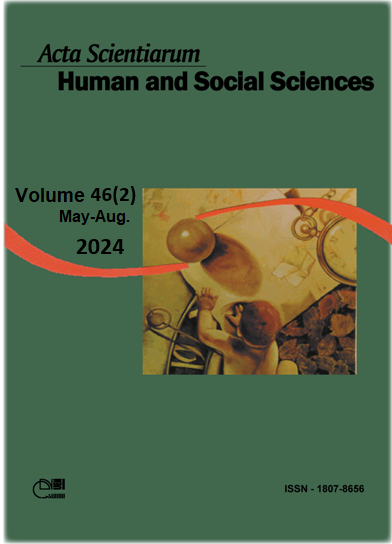Conflitos antropológico-existenciais e sofrimento humano em sobreviventes da Covid-19 que passaram por internamento na UTI de um hospital público do norte gaúcho
Resumo
Este estudo teve como objetivo investigar os dilemas e conflitos antropológico-existenciais enfrentados por sobreviventes da Covid-19 que estiveram em Unidades de Terapia Intensiva (UTI) em um hospital público no norte do Rio Grande do Sul. Trata-se de uma pesquisa qualitativa, na qual participaram pacientes sobreviventes da Covid-19 que passaram por Unidade de Terapia Intensiva (UTI) em um Hospital Público do Norte do Rio Grande do Sul, que repercutiram em sofrimento humano, emergência da consciência da finitude, ocorrência de angústia e crise existencial após a sua internação e passar pela doença. O universo são seis indivíduos que frequentavam o centro de reabilitação pulmonar de uma Universidade do Norte do RS. A adesão foi voluntária. A coleta de dados foi por entrevista. A análise de dados é de conteúdo. O referencial teórico ampara-se em autores como Barros, Marini e Reali (2022), Becker (2022), D’Assumpção (2011), Franco (2021), Gawande (2015), Gadamer (2006), Santos (2021), Santos (2009), Nuland (1995), dentre outros. Os resultados demonstram que houve sofrimento humano intenso. Os entrevistados enfrentaram crise existencial diante da evolução da doença, do desamparo a seus familiares e medo da morte. Expressaram que davam muita importância a cada pequena melhora que ocorria. Sentiram solidão, apegaram-se à espiritualidade como forma de manter a esperança. Revelaram que passaram a ver a vida de outro modo e a valorizar mais as pessoas que fazem parte de sua família. Essa pesquisa indica a necessidade de atentar e ampliar o cuidado para amenizar o sofrimento das pessoas que foram acometidas pela Covid-19.
Downloads
Referências
Referências
Angerami-Camon, V. A. (2007). Psicoterapia existencial. São Paulo, SP: Câmara Brasileira do Livro.
Aquino, T. A. A., Serafin, T. D. B., Silva, H. D. M., Barbosa, E. L., Cirne, E. A., Ferreira, F. R., & Dantas, P. R. S. (2010). Visões de morte, ansiedade e sentido da vida: um estudo correlacional. Psicologia Argumento, 28(63), 289-302. DOI: https://doi.org/10.7213/rpa.v28i63.20069
Bajardi, P., Poletto, C., Ramnasco, J. J., Tizzoni, M., Colizza, V., & Vespignani, A.(2011). Human mobility networks, travel restrictions, and the global spread of 2009 H1N1 pandemic. PLoS ONE, 6(1), e16591. DOI: https://doi.org/10.1371/journal.pone.0016591
Barros, B. C., Marini, C., & Reali, A. M. M. R. (2022). Práticas de ensino na pandemia: uma visão a partir do Desenvolvimento Bioecológico. Contexto & Educação, 37(119), 1-20. DOI: https://doi.org/10.21527/2179-1309.2022.119.12114
Becker, E. (2022). A negação da morte: uma abordagem psicológica sobre a finitude humana. Rio de Janeiro, RJ: Record.
Brasil. Ministério da Saúde. (2020). Plano de contingência nacional para infecção humana pelo novo Coronavírus 2019-nCoV: centro de operações de emergências em saúde pública (COE-nCoV). Brasília, DF: Ministério da Saúde. Recuperado de http://portalarquivos2.saude.gov.br/images/pdf/2020/fevereiro/07/plano-contingencia-coronavirus-preliminar.pdf
Camargo, J. J. P. (2014). A tristeza pode esperar: uma jornada de afeto, perda e separação entre o médico e seus pacientes. Porto Alegre, RS: L & PM.
Canguilhem, G. (1995). O normal e o patológico. Rio de Janeiro, RJ: Forense Universitária.
D’Assumpção, E. A. (2011). Sobre o viver e o morrer - manual de tanatologia e biotanatologia para os que partem e os que ficam. Petropolis, RJ: Vozes.
European Centre for Disease Prevention and Control [ECDC]. (2020). Considerations relating to social distancing measures in response to COVID-19: second update. Recuperado de http://www.ecdc.europa.eu/sites/default/files/documents/covid-19-social-distancing-measuresg-guide-second-update.pdf
Faustini, M. S. A. (2014). O ser humano contemporâneo como sujeito da bioética. Contexto & Educação, 29(93), 22-44. DOI: https://doi.org/10.21527/2179-1309.2014.93.22-44
Franco, M. H. P. (2021). O luto no século 21:uma compreensão abrangente do fenômeno. São Paulo, SP: Summus.
Gadamer, H. (2006). O caráter oculto da saúde. Petrópolis, RJ: Vozes.
Gawande, A. (2015). Mortais: nós, a medicina e o que realmente importa no final. Rio de Janeiro, RJ: Objetiva.
Han, B. (2020). Morte e alteridade. Petrópolis, RJ: Vozes.
Kastenbaum, R., & Aisenberg, R. (1983). Psicologia da morte. São Paulo, SP: Pioneira.
Kovács, M. J. (2011). Morte e desenvolvimento humano. São Paulo, SP: Casa do Psicólogo.
Kübler-Ross, E. (2011). Sobre a morte e o morrer:o que os doentes terminais têm para ensinar a médicos, enfermeiros, religiosos e aos seus próprios parentes. São Paulo, SP: Martins Fontes.
Nuland, S. B. (1995).Como morremos:reflexões sobre o último capítulo da vida. Rio de Janeiro, RJ: Rocco.
Peres, J. F. P. (2009). Respostas pós-trauma de sobreviventes da morte. In F. S. Santos (Org.), Cuidados paliativos: discutindo a vida, a morte e o morrer (p. 387-409). São Paulo, SP: Atheneu.
Sá, D. M. (2009) A voz do Brasil: Miguel Pereira e o discurso sobre o “imenso hospital”. História, Ciências, Saúde, 16(supl.1),333-348.
Santos, B. S. (2020). A cruel pedagogia do vírus. Coimbra, PT: Edições Almedina.
Santos, B. S. (2021). O futuro começa agora: da pandemia à utopia. São Paulo, SP: Boitempo.
Santos, F. S. (Org.) (2009). Cuidados paliativos:discutindo a vida, a morte e o morrer. São Paulo, SP: Atheneu.
Schwarcz, L. M., & Starling, H. M. (2020). A bailarina da morte: a gripe espanhola no Brasil. São Paulo, SP: Companhia das Letras.
DECLARAÇÃO DE ORIGINALIDADE E DIREITOS AUTORAIS
Declaro que o presente artigo é original, não tendo sido submetido à publicação em qualquer outro periódico nacional ou internacional, quer seja em parte ou em sua totalidade.
Os direitos autorais pertencem exclusivamente aos autores. Os direitos de licenciamento utilizados pelo periódico é a licença Creative Commons Attribution 4.0 (CC BY 4.0): são permitidos o acompartilhamento (cópia e distribuição do material em qualqer meio ou formato) e adaptação (remix, transformação e criação de material a partir do conteúdo assim licenciado para quaisquer fins, inclusive comerciais.
Recomenda-se a leitura desse link para maiores informações sobre o tema: fornecimento de créditos e referências de forma correta, entre outros detalhes cruciais para uso adequado do material licenciado.

























